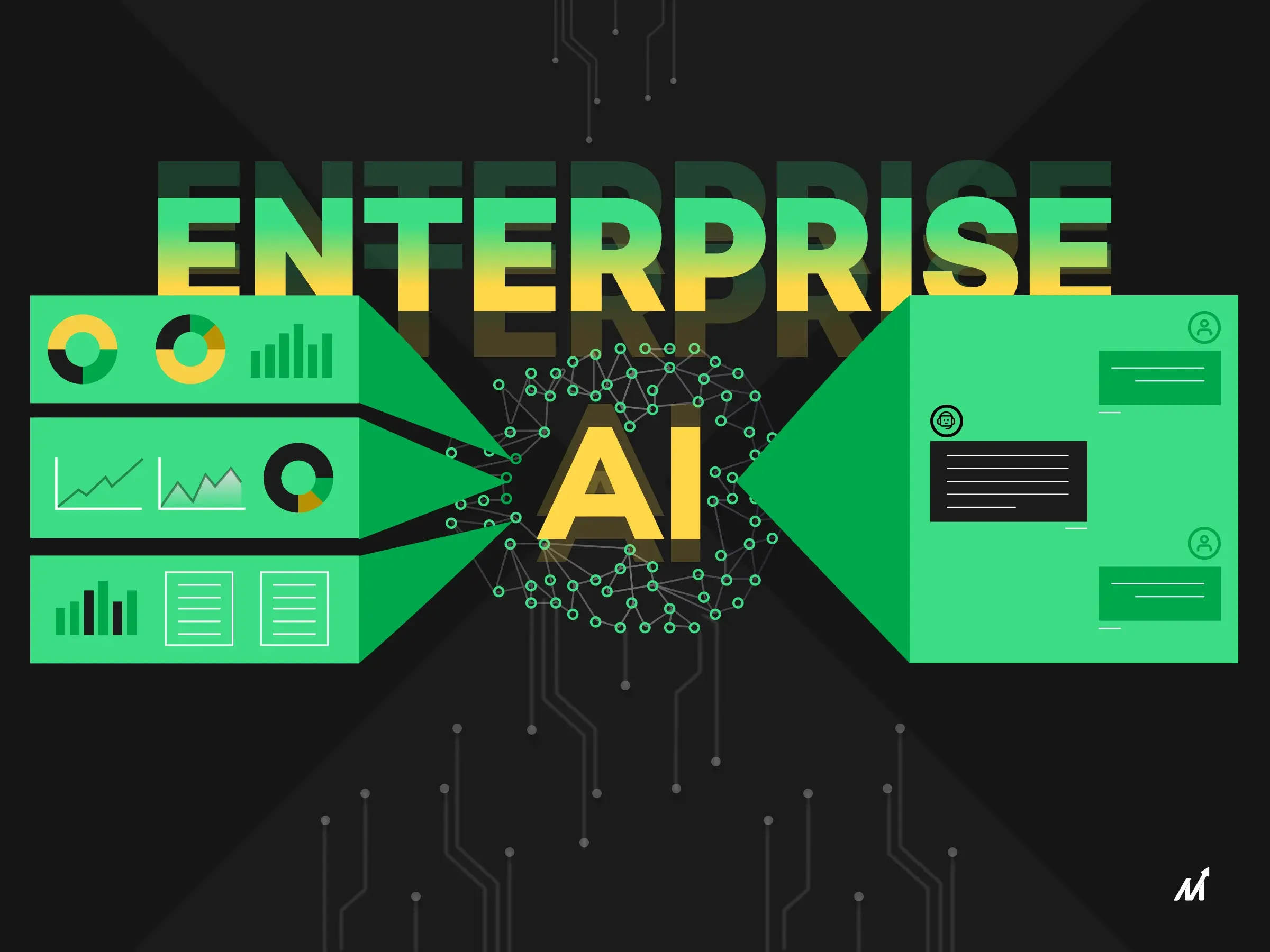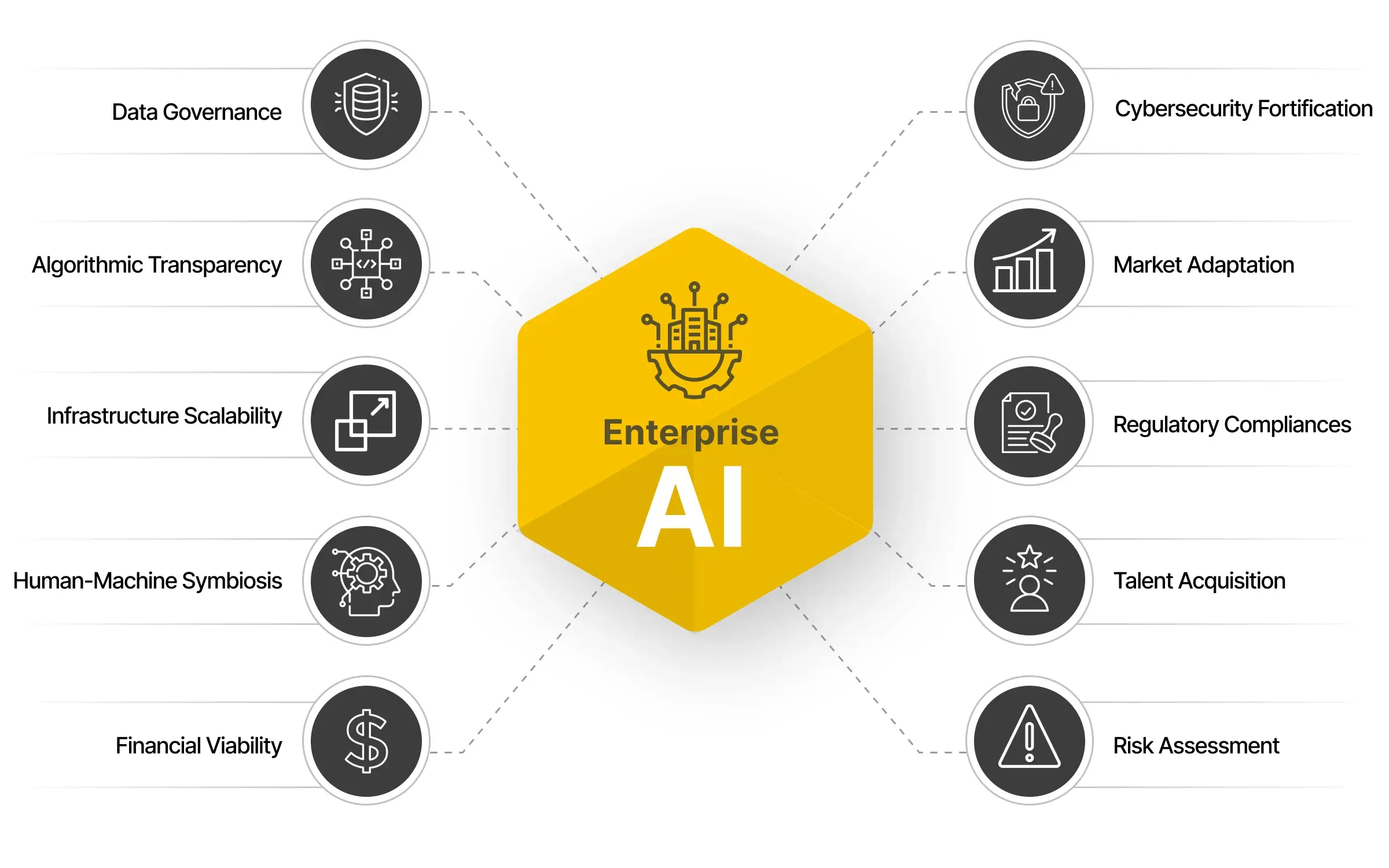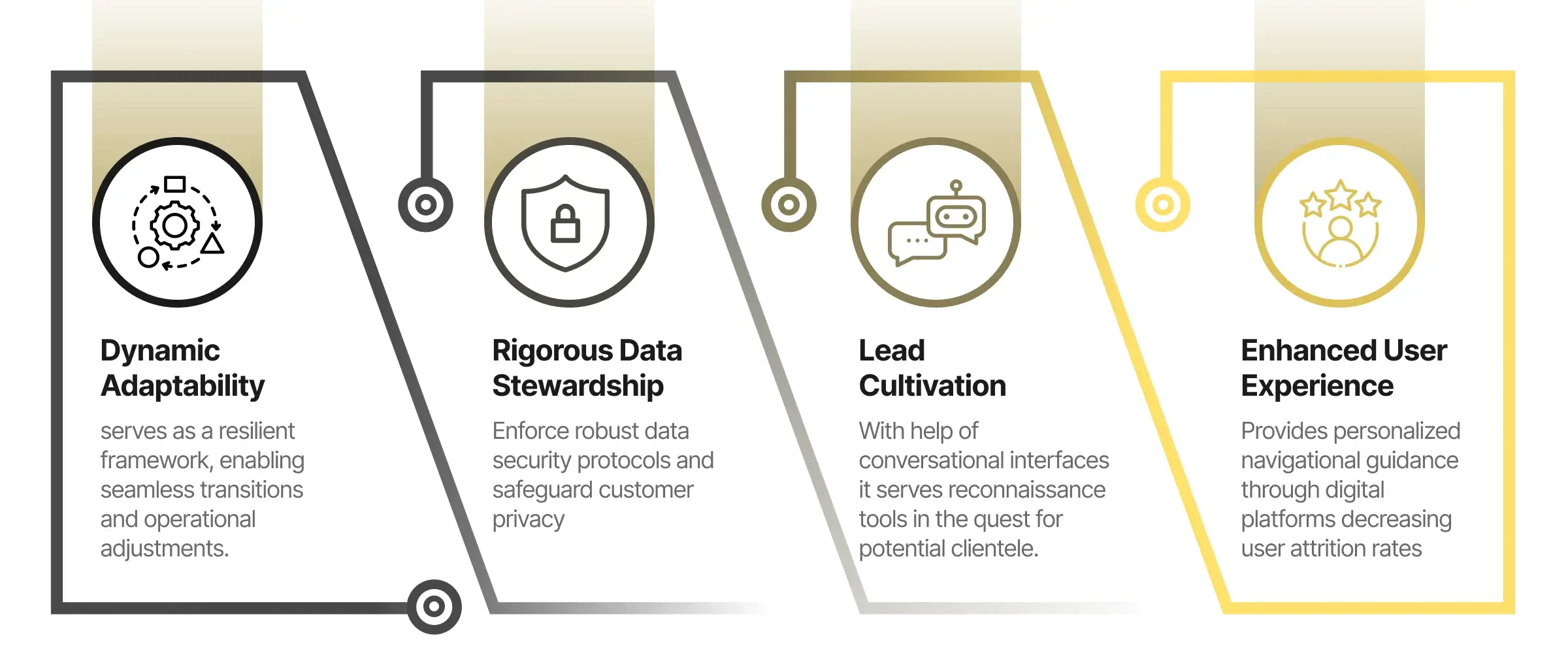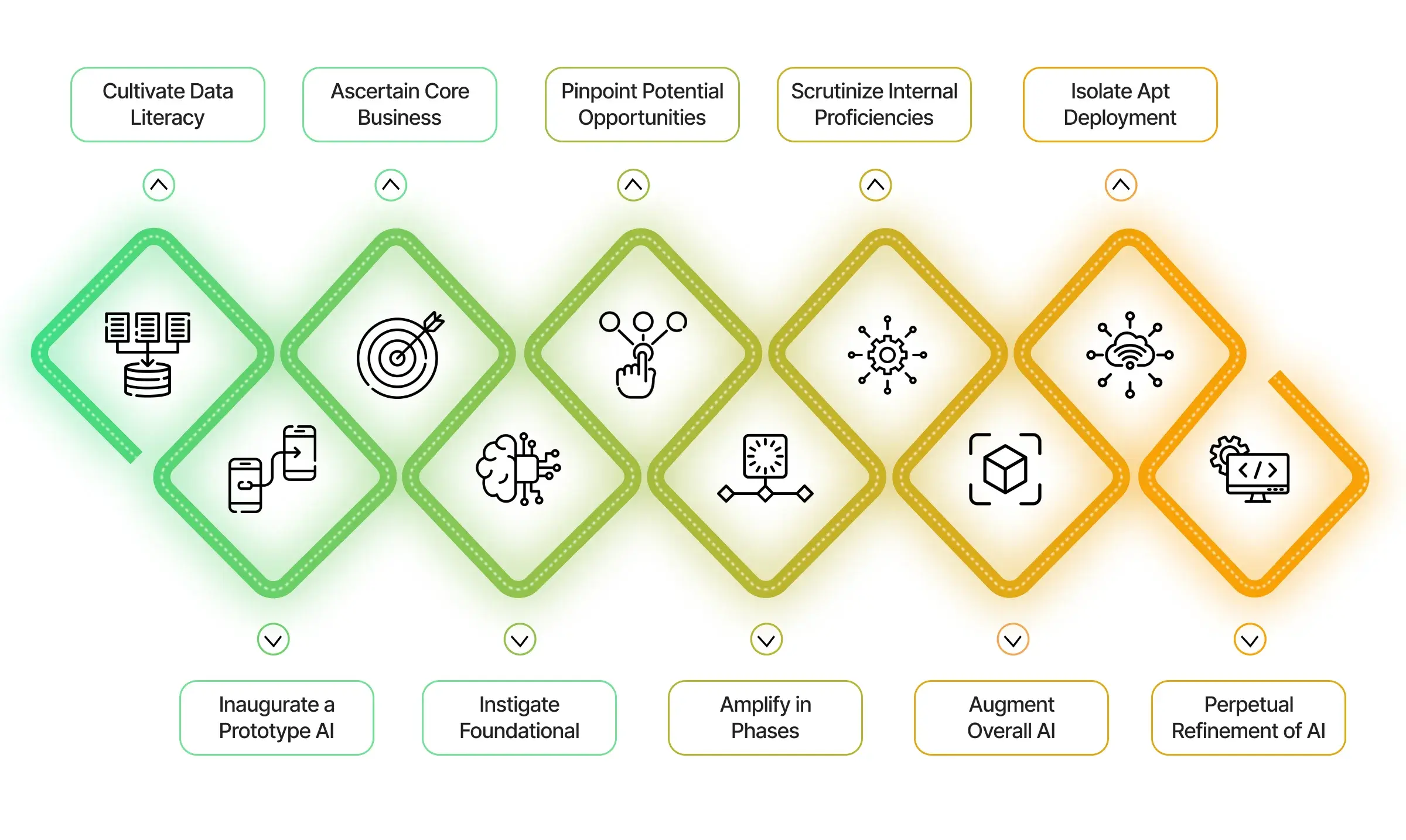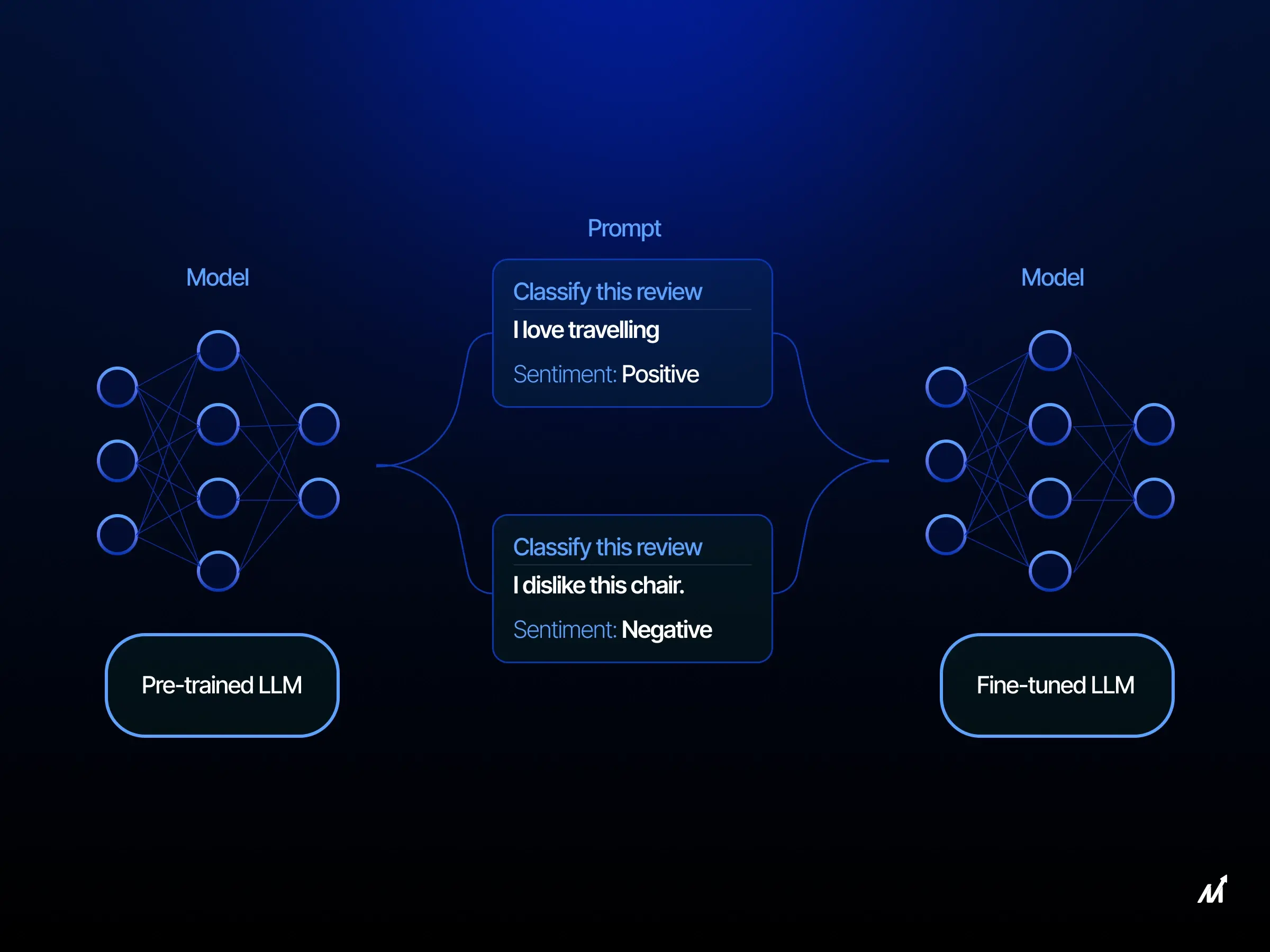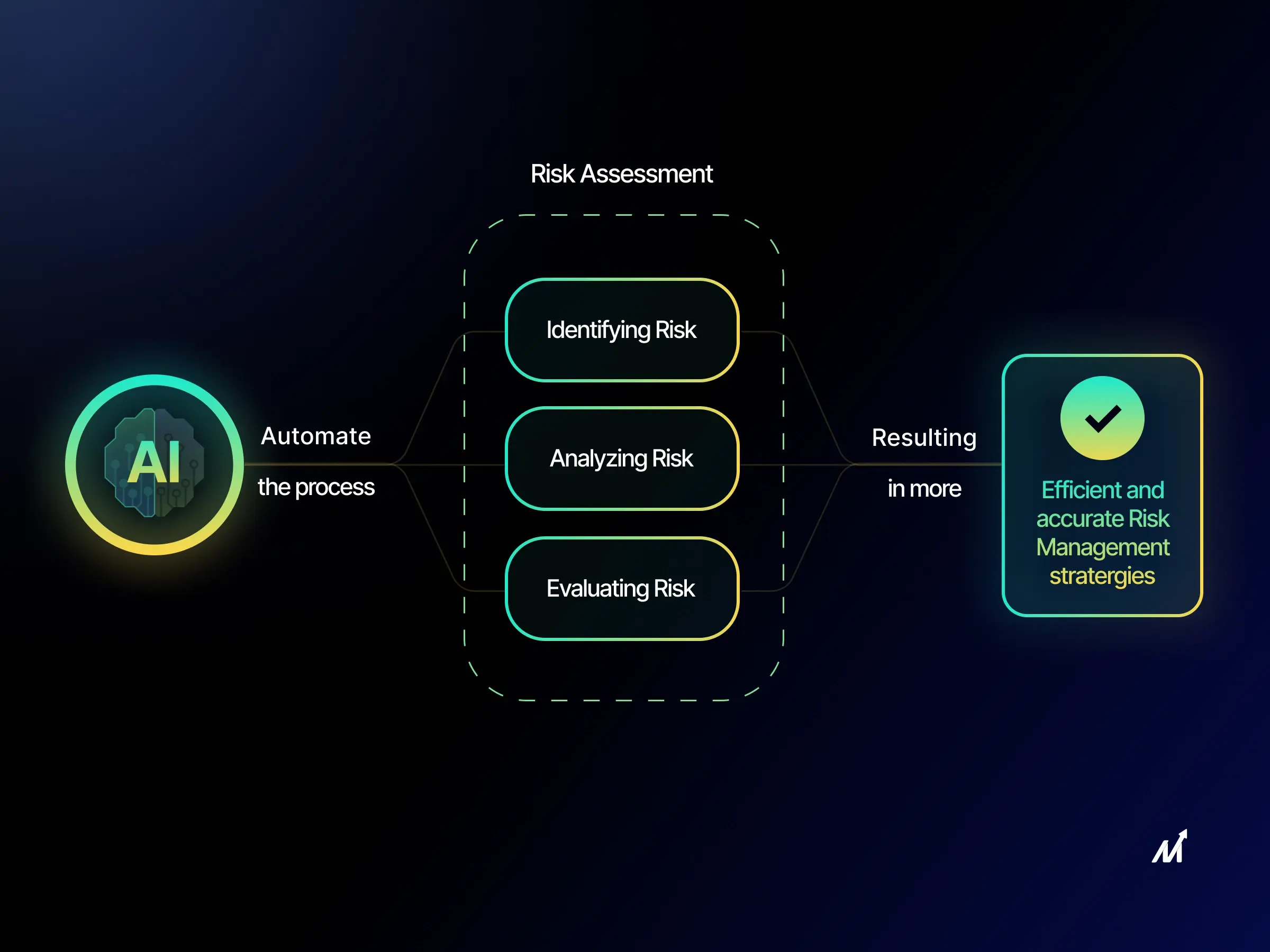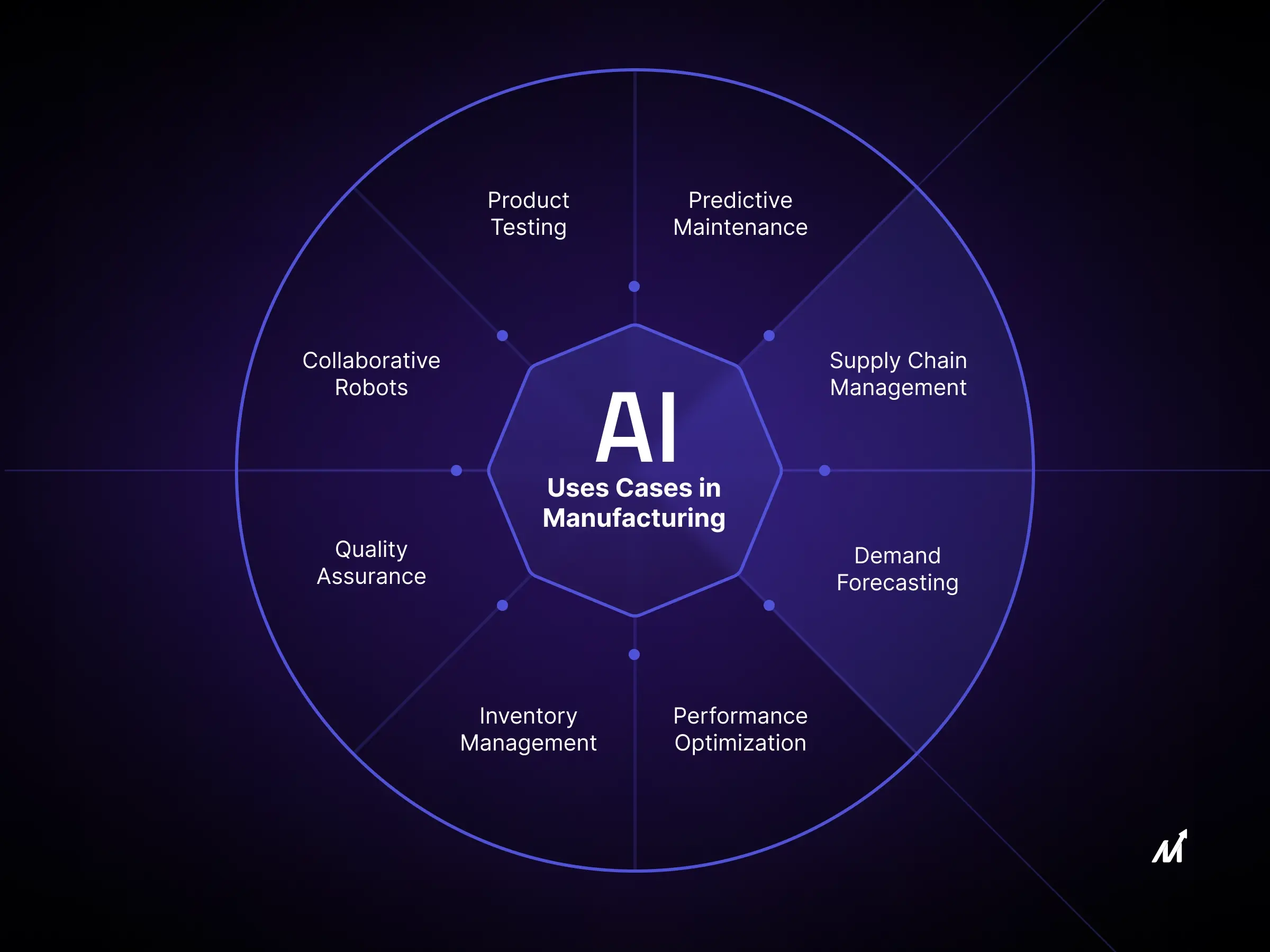According to Gartner’s eye-opening estimate, artificial intelligence produced $2.9 trillion in commercial value and freed up 6.2 billion labor hours in 2021 alone. This information should serve as a wake-up call for individuals who are still unaware of the revolutionary potential of enterprise AI technology and data science, especially in light of the fact that many businesses, both established and start-up, have already embraced AI technologies to boost productivity. Let’s dive deep and understand what Artificial Intelligence for enterprise applications means for businesses.
Enterprise AI: An Overview
The integration of artificial intelligence and ML algorithm within global enterprise ecosystems is fundamentally redefining operational paradigms. Firms are meticulously embedding advanced AI frameworks into their workflows, targeting cost reduction, operational amplification, data-driven stratagems, and market innovation.
Enterprise-level applications fueled by machine learning model and AI algorithms are revolutionizing customer engagement protocols, amplifying revenue streams, fortifying cybersecurity infrastructure, streamlining supply chain logistics, liberating human resources from repetitive undertakings, augmenting existing product portfolios, and signposting avenues for novel product development. The influence of artificial intelligence—characterized by the mechanized mimicry of human cognitive functions—is ubiquitous, extending its tentacles into virtually every corporate sphere.
Nevertheless, executives are resolute on harnessing the transformative power of AI for enterprise to bolster business outcomes and ensure fiscal dividends confront an intricate labyrinth of obstacles that transcend mere technological implementation. Herein, the exigencies can be delineated along multiple vectors:
-
Data Governance:
One of the foremost challenges lies in data governance protocols. Establishing a robust framework for data integrity and compliance, especially with regulations such as GDPR, is paramount. Moreover, the quality and scalability of data are indispensable variables in AI algorithms’ efficacy.
-
Algorithmic Transparency:
Ensuring the comprehensibility and ethical integrity of machine learning models is essential. This involves being forthright about the data used in training algorithms, the limitations of the models, and the rationale behind specific outputs. Algorithmic transparency mitigates risks associated with bias and enhances accountability.
-
Infrastructure Scalability:
An often-overlooked aspect pertains to the scalability of hardware and software infrastructures. They should be agile enough to adapt to increasing data loads and computational requirements without hampering business continuity.
-
Human-Machine Symbiosis:
Creating an environment wherein human intellect complements machine capabilities is crucial. This entails reshaping job profiles and skill sets to accommodate and leverage advancements in artificial intelligence, thereby creating a symbiotic relationship that augments productivity.
-
Financial Viability:
Budgetary constraints often dictate the pace at which AI can be integrated into business operations. Ensuring a favorable ROI without jeopardizing long-term objectives requires judicious fiscal planning and resource allocation.
-
Cybersecurity Fortification:
Given that AI algorithms often necessitate access to sensitive information, fortifying cybersecurity protocols is non-negotiable. This includes continuous monitoring of data access points and the encryption of data at rest and in transit.
-
Market Adaptation:
The competitive landscape is continually evolving, with AI technologies like generative AI perpetually growing fats. Market adaptation thus becomes a moving target, requiring vigilant monitoring of technological trends and swift incorporation of innovations that align with strategic business objectives.
-
Regulatory Compliances:
Global regulations are still catching up with the rapid advancements in AI technologies. Compliance with future regulations can pose substantial challenges and necessitate modifications in existing AI frameworks.
-
Talent Acquisition:
A scarcity of skilled personnel proficient in AI technologies and AI platforms can impede the pace of adoption and optimization. The focus must be on both talent acquisition and continuous training programs to bridge the skill gap.
-
Risk Assessment:
Implementing AI solutions entails a multifaceted risk portfolio, including but not limited to operational, ethical, and financial risks. Comprehensive risk assessment and mitigation strategies are indispensable.
What is Enterprise AI?
Enterprise artificial intelligence serves as a specialized domain within the broader field of artificial intelligence, specifically engineered to augment the operational efficacy of large-scale corporations. The key objective of deploying enterprise-level AI solutions lies in the optimization of various components in the organizational value chain. The eventual outcome manifests as amplified business agility, operational efficiency, and, consequently, increased profitability. It also enables accelerated decision-making processes and heightens workforce productivity.
Innovative strides in the domains of artificial intelligence, cognitive automation, and machine learning algorithms have precipitated a paradigm shift in the existing enterprise AI ecosystem. These advancements have not merely supplemented but have become integral to how businesses operate, raising the imperative for prompt technological assimilation. Enterprises are now at a junction where the integration of such advanced AI capabilities is not just a competitive advantage but a necessity for survival in an increasingly digital marketplace. Failure to adapt to this evolving landscape essentially puts organizations on the trajectory toward obsolescence.
Why is Enterprise AI so important?
In the high-stakes arena of modern business, think of Artificial Intelligence (AI) as the new electricity. Remember how electrification in the early 1900s didn’t just juice up the factories but lit the bulb for entirely new industries like mass media? That’s what AI is doing now. It’s more than just a tool; AI application in daily operations is a game-changer that’s becoming non-negotiable for businesses grappling with today’s high levels of complexity and scale.
The Big Scene
So what’s the big deal? Well, for starters, AI is not just about automating tasks that humans do; it’s about doing them smarter. Sure, automation tools have made life easier, but AI takes it to a whole new level. It digs through tons of data to find the best way to get something done and then fine-tunes the process on the fly if things change. Imagine having an uber-smart assistant who not only knows what you need to do but also figures out the best way to do it and adapts in real time. That’s the level of efficiency we’re talking about when we say enterprise AI solutions.
This is not just theory; it’s happening right now across various fields. In healthcare, AI is sidekicking doctors by diagnosing medical conditions with the kind of accuracy that saves lives. In customer service, it’s helping agents solve your problems quicker than you can say, “Hold the line.” When it comes to cybersecurity, AI is your new security guard, detecting threats even before they materialize and setting priorities for human experts to handle them. Banking? AI application got that covered, too, fast-tracking loan processes and making sure everything’s by the book, compliance-wise.
Now, here’s where things get really interesting: Generative AI development. This is the next-gen stuff that’s blowing the lid off what AI can do. We’re not just talking about answering questions or making recommendations. Generative AI can create—from writing code and essays to even making art. This tech is catching on like wildfire. Large language models from platforms like ChatGPT, Bard, and Copilot are making these advanced AI capabilities accessible to everyone. You don’t have to be a techie to tap into Generative AI; it’s becoming as mainstream as using a search engine.
(Learn more about ChatGPT integration here)
How does Enterprise AI Contribute to Your Business?
Within the corporate landscape, artificial intelligence (AI) serves as a linchpin for transformative change, extending far beyond mere cost-cutting and labor minimization. The ramifications of integrating an AI model into an enterprise architecture can be multi-faceted.
1. Dynamic Adaptability
In the business arena, where market conditions can pivot in unpredictable ways, companies encounter imperatives for change—often abruptly. Such shifts might stem from market fluctuations, regulatory changes, or unforeseen disruptions. Enterprise AI serves as a resilient framework, enabling seamless transitions and operational adjustments without compromising efficiency—essentially creating a fluid business model capable of rapid evolution.
2. Rigorous Data Stewardship
The contemporary digital milieu has triggered an exponential surge in data acquisition, necessitating meticulous data management protocols. Enterprise AI systems enforce robust data security protocols and safeguard customer privacy. A notable augmentation of AI integration is the capacity for behavioral analytics, which is instrumental in detecting fraudulent activities and initiating timely alerts.
3. Lead Cultivation
From a sales and marketing standpoint, identifying the optimal client base remains pivotal. Enterprise AI-powered conversational interfaces—be it chatbots or more sophisticated dialog systems—amass critical data on customer predilections, effectively serving as reconnaissance tools in the quest for potential clientele.
4. Enhanced User and Workforce Experience
AI applications refine user experience by providing personalized navigational guidance through digital platforms, thereby decreasing user attrition rates. Concurrently, employees benefit from the delegation of monotonous tasks to automated systems, liberating human resources to engage in endeavors that yield higher intellectual and economic dividends.
In sum, the inclusion of artificial intelligence within an enterprise is not merely a strategic advantage; it’s an operational imperative. It foments dynamic adaptability, enforces stringent data governance and better predictive analytics, facilitates lead generation, and enriches both customer and employee experiences.
Challenges in the Way of Adopting Enterprise AI
Here are several challenges to look for;
1. Data Complexity Quandaries
Navigating the labyrinthine corridors of data acquisition necessitates a strategic approach, especially when sifting through voluminous, unstructured personal data. The rigor of compliance with data privacy legislation is non-negotiable. Data ingested from a plethora of sources may present a dichotomy, appearing obfuscated in one context while transparent in another. Therefore, data cleansing and filtration must be executed to restrict the dataset to the absolute essentials for operational efficacy.
2. Technological Limitations
Contrary to the dystopian narrative often associated with artificial intelligence, technological advancement has yet to catch up with the soaring flights of human creativity. Fanciful visions of Terminator-like automation remain in the realm of science fiction, emphasizing the existing limitations in AI capabilities.
3. Machine-Human Interplay
Establishing an unambiguous communication conduit between computational and biological intelligence is pivotal. Clearly defined roles and responsibilities are integral for seamless operations. Consider the hypothetical implementation of an AI solution designed to eradicate environmental contaminants; misinterpretation of human activity as a hindrance could potentially result in calamitous outcomes.
4. Security Vulnerabilities
While artificial intelligence excels at identifying fraudulent activities, it’s not entirely immune to exploitation. Unscrupulous individuals may capitalize on vulnerabilities, potentially compromising the integrity of the collected data.
5. Algorithmic Stagnation
AI models are susceptible to delivering skewed results or exhibiting dysfunctional behavior when encountering an operational deadlock. Such algorithmic impasses could wield an adverse impact on enterprise-level functionalities, posing a challenge to organizational objectives.
Initiating a venture into artificial intelligence (AI) necessitates a methodological orientation rather than an impromptu leap of faith. Initial endeavors often present imperfections, rendering an iterative, incremental approach favorable over a wholesale transformation.
Methodical Strategies for Enterprise AI Deployment
Outlined here are sequential stages to facilitate effective AI integration within an enterprise environment.
1. Cultivate Data Literacy
Data serves as the fuel for AI, and an elementary comprehension of data dynamics is imperative. Recent surveys indicate that though there is a surge in data analytics adoption, a significant portion of organizations grapple with deploying insights efficiently. The underlying reason often lies in the lack of sophisticated analytics acumen, thereby necessitating executive cognizance and investment in nurturing data literacy.
2. Ascertain Core Business Objectives
Profound reconnaissance into AI ventures within and across industry boundaries can spark curiosity and catalyze initiation. It is essential to discern primary use cases, evaluate their practicality and worth, and outline a strategic blueprint that encapsulates data monetization avenues and sustains project vigor.
3. Pinpoint Potential Opportunities
Special attention must be devoted to business segments with elevated variability and lucrative returns. A consortium of business shareholders endowed with technological and data know-how should employ quantifiable metrics to gauge the impact of AI on organizational structure and personnel.
4. Scrutinize Internal Proficiencies
Subsequent to the prioritization of use cases, an internal audit must be undertaken to align these applications with existing technological frameworks and human capital. Customized educational modules can serve to address any gaps in technical prowess, while external collaboration can expedite the development of promising AI applications.
5. Isolate Apt Deployment Scenarios
Refining a voluminous array of opportunities to an implementable AI venture is crucial—be it automating invoice reconciliation, utilizing IoT for facial identification, executing predictive sustenance on archaic systems, or deciphering consumer purchasing behaviors.
6. Inaugurate a Prototype AI Undertaking
The metamorphosis of a viable AI deployment candidate into an authentic project demands a coalition of AI specialists, data analysts, and corporate process experts. These teams must collate data, engender AI algorithms, orchestrate controlled launches, and quantify impact and risk variables.
7. Instigate Foundational Comprehension
Early successes and setbacks in AI ventures serve as educational linchpins for the entire organization. It’s essential to integrate human judgment in algorithmic decisions to foster organizational trust and ensure robust communication between data scientists and business strategists.
8. Amplify in Phases
The propagation of AI initiatives hinges on acquiring minor triumphs that elevate collective confidence and galvanize stakeholder participation. Subsequent ventures benefit from a fortified and substantiated foundational understanding, facilitating scaled deployments with calibrated algorithms and operational procedures.
9. Augment Overall AI Capabilities
As AI applications escalate, there is a parallel need to fortify the entire continuum of AI product development, examination, and roll-out. This involves cultivating a contemporary data platform optimized for analytics, creating an agile organizational structure for efficient data governance, and articulating a comprehensive strategy for data asset management.
10. Perpetual Refinement of AI Constructs and Protocols
Subsequent to the establishment of a robust AI infrastructure, it becomes indispensable to continually scrutinize and optimize AI paradigms. Given that models may experience degradation or become obsolete due to rapid environmental shifts, ongoing assessment is essential. Monitoring stakeholder feedback further equips teams to refine AI deployments, ensuring they remain aligned with evolving business needs and external conditions.
By adhering to this scrupulously devised framework, organizations can seamlessly transition from conceptualizing AI as an abstract idea to ingraining it as an integral business component, thereby driving sustained change and realizing tangible benefits.
What Constitutes Artificial Intelligence and Its Mechanisms of Operation?
In the modern corporate landscape, a majority of tasks necessitate a nuanced degree of intellectual capability. To encapsulate what constitutes intelligence, particularly in a professional context, remains an intricate endeavor. At its most fundamental level, intelligence can be perceived as the aptitude to assimilate information and deploy it in a manner conducive to achieving specific objectives. Notably, the actions undertaken are contextually dependent and are not relegated to mere mechanical repetition.
Artificial Intelligence (AI) refers to endowing machines with this form of decision-making capacity. The concept, however, lacks a univocal or straightforward explanation. According to a seminal analysis issued by the United States National Science and Technology Council in 2016, the scope of AI oscillates between two primary interpretations. One faction posits AI as a computational apparatus demonstrating attributes conventionally equated with human intelligence. Another viewpoint delineates AI as an intricate system proficient in judiciously dissecting multifaceted dilemmas or in executing strategies conducive to attaining its predefined aims, irrespective of external circumstances.
Further complicating this conceptual landscape is the evolving criterion for what embodies an ‘intelligent machine.’
Examining the granular architecture of AI programming yields insights into its triad of cognitive proficiencies: knowledge acquisition, rational inference, and iterative refinement.
-
Knowledge Acquisition:
Within the purview of AI programming, the cornerstone remains the procurement of data and the subsequent formulation of directives aimed at transmuting this data into functional insights. These governing principles, commonly termed algorithms, furnish computational entities with sequential guidelines to execute discrete assignments.
-
Rational Inference:
The subsequent dimension involves AI’s dexterity in selecting an optimum algorithmic approach from a repository of multiple algorithms pertinent to a given scenario. This phase embodies the logical deliberation integral to AI’s modus operandi, enabling the system to adapt its computational processes to the demands of a specific contextual landscape.
-
Iterative Refinement:
The third prong of AI’s cognitive functionality pertains to its inherent aptitude for self-amelioration. AI systems harness this facet to incrementally fine-tune an output, aligning it progressively closer to the aspired objectives. This self-regulatory mechanism ensures that AI systems undergo a continual evolutionary trajectory, thereby enhancing the precision and reliability of their operational outcomes.
How Markovate can help with Enterprise AI?
At Markovate, we don’t just understand the buzz around Enterprise AI Development; we are the artisans behind its most effective applications. Rooted in deep domain expertise in data analytics, machine learning, and artificial intelligence, we craft bespoke AI project solutions that transcend the generic “AI makeover” many companies settle for. Our strategy is surgically precise: we dissect your business model to identify specific bottlenecks or inefficiencies that AI services can resolve, making sure that the technology serves your unique needs and contributes to your strategic goals.
As one of the top Machine Learning companies, we work collaboratively with your internal teams, our data scientists and machine learning engineers delve into the granular aspects of your operations. The result is a tailor-made AI infrastructure that elevates your organizational processes, whether it’s automating manual tasks in your supply chain or utilizing advanced analytics to personalize customer experiences. Our focus is twofold when it comes to AI-based solutions: immediate impact and long-term scalability. That means your business doesn’t just get a short-term boost; it gains a durable competitive edge.
But technology is ever-evolving, and so is our commitment. Post-implementation, we continue to monitor system performance through real-time analytics. This ongoing engagement allows for quick iterations and agile responses to any emergent challenges or opportunities, ensuring that your Enterprise AI capabilities are perpetually at their peak performance.
So when the aim is not just to adopt but to excel in the Enterprise AI sphere, Markovate serves as your specialized Enterprise AI development company, steering you through the complexities with finesse and technical acumen.
Enterprise AI – FAQs
1. What Exactly is Enterprise AI, and How’s it Different from Your Everyday AI?
Let’s cut through the buzzwords. Enterprise AI is like the new entrant in the AI family, designed to take care of big business problems. Unlike general AI solutions, which you might find playing chess or generating art, enterprise AI rolls up its sleeves to tackle complex tasks within an enterprise. Think supply chain logistics, customer service automation, and crunching big data for insights. It’s all about making a tangible impact on the bottom line with AI implementation—boosting profits, efficiency, and agility in the business world.
2. What Good Comes Out of Bringing Enterprise AI into a Business?
So, why should a business invest in enterprise AI? Well, several reasons:
-
Time and Cost Savings: Automate the mundane stuff and let the human team focus on creativity and problem-solving.
-
Smarter Decisions, Faster: Advanced analytics can help businesses make well-informed choices in the blink of an eye.
-
Money Talks: Tailoring customer experiences using AI can directly contribute to sales growth.
-
Stay Nimble: The AI market is growing fast. The business landscape changes fast, and AI-driven insights can help you pivot or adapt at pace.
3. Are There Any Roadblocks to Implementing Enterprise AI?
Absolutely, it’s not all smooth sailing. For starters:
-
Data Quagmires: Bad data in, bad insights out. If your data isn’t up to snuff, your AI won’t be either.
-
Old Meets New: The existing tech infrastructure might throw a hissy fit when you try to introduce modern AI solutions.
-
Talent Shortage: Not every organization has a bench of AI whizzes and data scientists, and attracting or nurturing that talent can be challenging.
-
The Ethical Maze: Concerns about data privacy and biased algorithms are real and need to be tackled head-on.
4. How Do I Make Sure My Enterprise AI Game Stays Strong in the Long Run?
Think ahead:
-
Scale Smart: Pick AI solutions that won’t get outdated in six months. They need to grow as your business does.
-
Play Nice: Compatibility is key. Your AI technologies should easily talk to other systems—current or future.
-
Never Stop Learning: The world of AI is always evolving. Keep tabs on the latest advancements to update your systems.
-
Do the Right Thing: Set up ethical guidelines from day one to avoid future hiccups around compliance and data usage.
Taking the time to consider these factors will not only get your enterprise AI off the ground but also ensure it’s a long-term asset that continues to add value.

